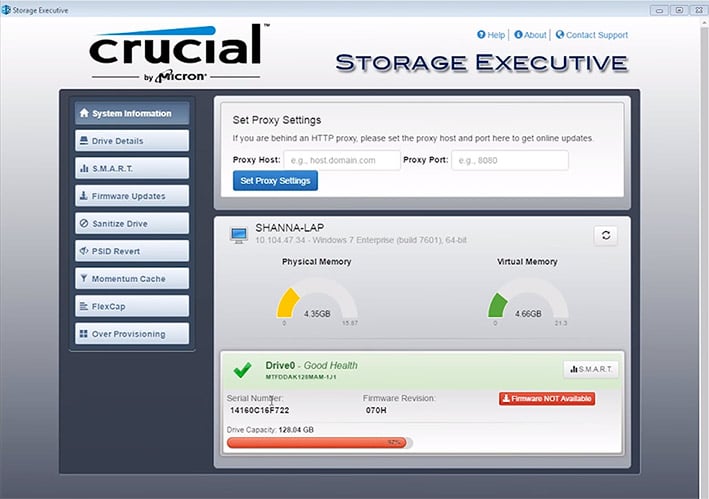Crucial P1 SSD Review: Nimble NVMe Storage For Pennies Per Gig
We’ve got the Crucial P1’s main features and specifications outlined in the table below. In light of some other NVMe-based solid state drives we’ve evaluated recent, the P1’s moderate specifications many not seem particularly drool-worthy, but when you consider the drives sell for roughly half the price of many higher-end offerings, things get much more interesting.
|
| Model: | Crucial P1 1TB SSD |
| Speeds: | 2,000 MB/s Read, 1,700 MB/s Write |
| 4K Random Read, Write: | 170K, 240K |
| Interface: | NVMe/PCIe Gen3 x4 |
| Density SSD: | 1TB |
| Device Type: | Internal Solid State Drive |
| Unit Dimensions: | 22mm x 80mm (2280) |
| Package Contents: | SSD, Acronis True Image for Crucial cloning software and installation instructions |
| Form Factor SSD: | M.2 2280 |
| Endurance: | 1TB drive = 200TB Total Bytes Written (TBW), approximately 109GB per day for 5 years |
| Life Expectancy (MTTF): | 1.5 million hours |
| Operating Temperature: | 0°C to 70°C |
| Warranty: | Limited 5-year |
The Crucial P1 will initially be offered in two capacities -- 500GB and 1TB. We have a 1TB drive on-hand here that we’ll be testing on the following pages.
All of the drives in the Crucial P1 family use the same M.2 (2280) 80mm ‘gumstick’ form factor, but performance varies depending on the capacity. The 500GB drive will put up sequential read speeds of roughly 1.9GB/s, with writes in the 950MB/s range, while the 1TB drive peaks at about 2GB/s reads, with much better 1.7GB/s writes. That kind of performance is far better than anything hanging off a SATA interface can muster, but it is not in the same league as more expensive NVMe PCIe-based drives, like Samsung’s 970 EVO Plus or PROs.
The Crucial P1 leverages Micron’s 64-layer QLC 3D NAND flash memory (initially 1Tb per die), which is more economical to produce than previous-gen TLC or MLC NAND. Paired to the NAND is a DRAM cache, and a native NVMe PCI Express controller built by Silicon Motion (SMI). There’s not much happening on the back of the drive, but the front is home to the aforementioned controller, the QLC NAND, and DRAM cache.
The SMI controller natively supports NVMe and has a x4 PCIe 3.0 interface (max bandwidth of 4GB/s). These drives also support all of the things you’d expect from a modern SSD, like TRIM, garbage collection, S.M.A.R.T., etc., but it also supports AES-256 encryption and Pyrite 1.0 and 2.0.
Like many drives that use TLC, or now QLC, NAND, Crucial configures a portion of the NAND on these drives to act as an SLC cache for faster write throughput. Depending on the unused capacity of the drive, however, the size of the SLC cache will dynamically adjust up or down. Though there is a set amount that remains fixed (5GB on the 500GB drive and 12GB on the 1TB drive), the overall amount of SLC available to accelerate writes fluctuates to up to 14%, based on the total and unused capacity of the drive. Should the SLC cache be filled, write performance takes a big hit, as you would expect. However, doing so requires continually writing large amounts of data and shouldn’t happen very often, if at all, with typical consumer workloads.
Crucial warranties the P1 series drives for 5 years, which is on par with other NVMe PCIe solid state drives, and endurance is rated for 100 TBW per 500GB of capacity. That’s somewhat low versus many other drives, but should be plenty for any consumer workload.
In terms of the packaging and bundle, everything included is pictured above. The drive comes in a simple box with cardboard reinforcement and a plastic shield, and that’s it. Support for the P1 has also been integrated into Crucial’s Storage Executive utility as well, which is available as a free download from company’s site. Storage Executive provides easy access to drive health data, maintenance tools, updates, etc.
Now let’s see how the Crucial P1 performs...








